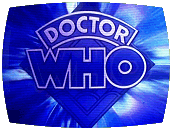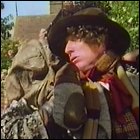 The Doctor and Sarah arrive near a village that Sarah recognizes as Devesham,but it’s immediately apparent that something is very wrong. Spacesuited robot guards patrol the countryside, firing guns built into their fingers at any intruders they see (including the time travelers), and they watch helplessly as a UNIT soldier bolts straight toward a cliff, and over the edge to his death. And yet he shows up later at the village pub, alive and well – and zombielike, until the clock strikes a certain hour. The Doctor has theories about the strange behavior, but nothing accounts for all of the variables until he realizes he’s not on Earth. Sarah is captured by androids disguised as UNIT troops, and taken to a ship manned by Kraal invaders, who have copied everyone from the villagers to Harry Sullivan as part of their plan to take over Earth.
The Doctor and Sarah arrive near a village that Sarah recognizes as Devesham,but it’s immediately apparent that something is very wrong. Spacesuited robot guards patrol the countryside, firing guns built into their fingers at any intruders they see (including the time travelers), and they watch helplessly as a UNIT soldier bolts straight toward a cliff, and over the edge to his death. And yet he shows up later at the village pub, alive and well – and zombielike, until the clock strikes a certain hour. The Doctor has theories about the strange behavior, but nothing accounts for all of the variables until he realizes he’s not on Earth. Sarah is captured by androids disguised as UNIT troops, and taken to a ship manned by Kraal invaders, who have copied everyone from the villagers to Harry Sullivan as part of their plan to take over Earth.
written by Terry Nation
directed by Barry Letts
music by Dudley SimpsonGuest Cast: Ian Marter (Harry Sullivan), John Levene (RSM Benton), Martin Friend (Styggron), Roy Skelton (Chedaki), Max Faulkner (Adams), Peter Welch (Morgan), Milton Johns (Guy Crayford), Stuart Fell (Kraal), Patrick Newell (Faraday), Dave Carter (Grierson), Heather Emmanuel (Tessa), Hugh Lund (Matthews)
Broadcast from November 22 through December 13, 1975
LogBook entry & review by Earl Green
Review: One of Terry Nation’s final Doctor Who scripts (and his last before production commenced on his own creation, Blake’s 7), The Android Invasion coasts through its first two episodes on creepy atmosphere alone, with seemingly normal places and people obviously dangerously amiss. But even when we get to the real Earth, things still seem odd – Colonel Faraday seems impossibly dense for someone who’s had enough UNIT experience to fill in for the Brigadier (unless the character was intended to be a regular Army officer who hasn’t had any experience dealing with UNIT’s usual extraterrestrial fare). Still, the atmosphere keeps things going nicely, but ultimately it’s atmosphere and setting standing in for plot – this story could have been told in three episodes, if not two.
 If there’s a real triumph to this story, it’s the Kraals, easily one of the best-designed alien races of Tom Baker’s era. Their mouths don’t move much, but they’re a wonderful invention, truly alien, and very individual – the different characters even have differing facial hair on their rhino-like faces to distinguish them. The way the actors playing them stand even hints at a physiology completely different from humans. From the masks to the costumes to the physical performance, it all adds up to something that, quite frankly, unlike a lot of Doctor Who aliens, just screams “alien.” Somewhat less successful is the attempt at hinting, through the set designs of their ship, that the Kraals may lean on organic technology, but the characters themselves are memorable. Why they haven’t appeared again (outside of the expanded universe of books) is beyond me. Hey, Russell T. Davies – we need a rematch with these guys.
If there’s a real triumph to this story, it’s the Kraals, easily one of the best-designed alien races of Tom Baker’s era. Their mouths don’t move much, but they’re a wonderful invention, truly alien, and very individual – the different characters even have differing facial hair on their rhino-like faces to distinguish them. The way the actors playing them stand even hints at a physiology completely different from humans. From the masks to the costumes to the physical performance, it all adds up to something that, quite frankly, unlike a lot of Doctor Who aliens, just screams “alien.” Somewhat less successful is the attempt at hinting, through the set designs of their ship, that the Kraals may lean on organic technology, but the characters themselves are memorable. Why they haven’t appeared again (outside of the expanded universe of books) is beyond me. Hey, Russell T. Davies – we need a rematch with these guys.
Android Invasion marks a number of farewells, though it’s handled in a very low-key way. Ian Marter makes his last appearance here a Harry Sullivan, though he would continue his association with the show as the writer of numerous novelizations based on classic episodes, until his death in 1986. This is also the last official appearance in Doctor Who proper of John Levene as RSM (formerly Sergeant) Benton of UNIT; he’d make one last in-character appearance in the fan film War Time over a decade later. Nicholas Courtney was unavailable for filming, so what could’ve been UNIT’s send-off instead comes off as a bit underwhelming.
It’s a mixed bag that sometimes suffers from its pacing, but The Android Invasion is at least enjoyable.

